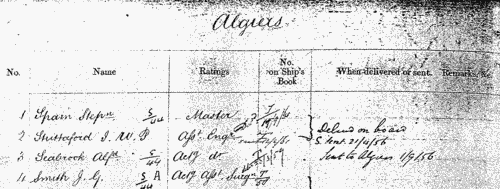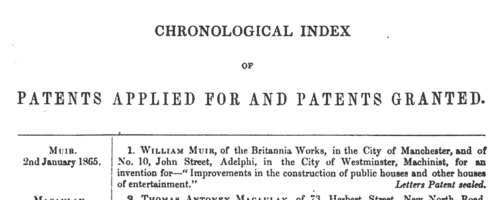Donnell Surname Ancestry ResultsOur indexes 1000-1999 include entries for the spelling 'donnell'. In the period you have requested, we have the following 90 records (displaying 41 to 50): Single Surname Subscription | | | Buying all 90 results of this search individually would cost £520.00. But you can have free access to all 90 records for a year, to view, to save and print, for £100. Save £420.00. More... |
These sample scans are from the original record. You will get scans of the full pages or articles where the surname you searched for has been found. Your web browser may prevent the sample windows from opening; in this case please change your browser settings to allow pop-up windows from this site.  Sailors of H. M. S. London who fought at Inkerman
(1854) Sailors of H. M. S. London who fought at Inkerman
(1854)
Sebastopol in the Crimea was the great Russian naval arsenal on the Black Sea. A combined assault by British, French and Turkish troops resulted in the reduction of Sebastopol and led to the Treaty of Paris of 27 April 1856, guaranteeing the independence of the Ottoman Empire. By Admiralty Order the Crimea Medal was awarded to sailors and marines present during the campaign, between 17 September 1854 (the first landing at Eupatoria) and 9 September 1855 (when the allies secured Sebastopol). Her Majesty's Ship London, a 90-gun sailing ship, took part in the assault. Four clasps to this medal were awarded to the men present in the actions at Sebastopol itself, Inkerman, Balaklave (Balaclava) and (the sea of) Azoff. This is the roll for the sailors of the ship actually present at the battle of Inkerman, on 5 November 1854, where the Russian troops made an ultimately unsuccessful attack on the allied army.DONNELL. Cost: £8.00.  | Sample scan, click to enlarge

| Soldiers Wounded in the Battle of Alma: 95th Regiment of Foot
(1854)
The commander of the British forces transmitted to the Secretary-at-War this return of casualties among non-commissioned officers and men sustained at and after the battle of Alma, 20 September 1854. This was the opening battle of the Crimean War, in which British forces seized the heights above the river Alma. The returns include those killed and wounded in the battle; missing; dead of wounds, and since dead, to 3 October 1854.DONNELL. Cost: £6.00.  | Sample scan, click to enlarge

|  Sailors and marines on H. M. S. Albion in the Crimean War
(1854-1856) Sailors and marines on H. M. S. Albion in the Crimean War
(1854-1856)
Sebastopol in the Crimea was the great Russian naval arsenal on the Black Sea. A combined assault by British, French and Turkish troops resulted in the reduction of Sebastopol and led to the Treaty of Paris of 27 April 1856, guaranteeing the independence of the Ottoman Empire. By Admiralty Order the Crimea Medal was awarded to sailors and marines present during the campaign, between 17 September 1854 (the first landing at Eupatoria) and 9 September 1855 (when the allies secured Sebastopol). The sailors' medals were mostly delivered to them on board ship in the course of 1856; the marines' medals were sent to their respective headquarters for distribution. The remarks as to distribution in this medal roll therefore give more specific information as to the whereabouts of the sailor recipients in 1856 than about the marines. Her Majesty's Ship Albion, a 90-gun sailing ship, took part in the assault. Four clasps to this medal were awarded to the men present in the actions at Sebastopol itself, Inkerman, Balaklave (Balaclava) and (the sea of) Azoff, but the recipients of these clasps are recorded on separate rolls, not part of this index, but indexed on this site.DONNELL. Cost: £8.00.  | Sample scan, click to enlarge

|  Sailors and marines on H. M. S. Algiers in the Crimean War
(1854-1856) Sailors and marines on H. M. S. Algiers in the Crimean War
(1854-1856)
Sebastopol in the Crimea was the great Russian naval arsenal on the Black Sea. A combined assault by British, French and Turkish troops resulted in the reduction of Sebastopol and led to the Treaty of Paris of 27 April 1856, guaranteeing the independence of the Ottoman Empire. By Admiralty Order the Crimea Medal was awarded to sailors and marines present during the campaign, between 17 September 1854 (the first landing at Eupatoria) and 9 September 1855 (when the allies secured Sebastopol). Her Majesty's Ship Algiers, a 90-gun sailing ship, took part in the assault. Four clasps to this medal were awarded to the men present in the actions at Sebastopol itself, Inkerman, Balaklave (Balaclava) and (the sea of) Azoff, but the recipients of these clasps are recorded on separate rolls, not part of this index, but indexed on this site.DONNELL. Cost: £8.00.  | Sample scan, click to enlarge

|  Sailors and marines awarded the Baltic Medal
(1854-1857) Sailors and marines awarded the Baltic Medal
(1854-1857)
During the Crimean War, a British and French fleet entered the Baltic, and captured Bomarsund harbour and one of the Aland Islands (now part of Finland). Bomarsund is the sound between the islands and the Swedish island of Vardo; and at the fine harbour on Bomarsund, dominating the entrance of the Gulf of Bothnia, and indirectly that of the Gulf of Finland, the Russians had constructed a northern naval base, and this was destroyed in the attack. The British fleet taking part in the Baltic expedition comprised Her Majesty's ships Aeolus, Ajax, Alban, Algiers, Amphion, Archer, Arrogant, Basilisk, Belleisle, Blenheim, Boscawen, Bulldog, Caesar, Calcutta, Centaur, Colossus, Conflict, Cornwallis, Cossack, Cressy, Cruizer, Cuckoo, Cumberland, Dauntless, Desperate, Dragon, Driver, Duke of Wellington, Edinburgh, Esk, Euryalus, Exmouth, Falcon, Firefly, Geyser, Gladiator, Gorgon, Hannibal, Harrier, Hastings, Hawke, Hecla, Hogue, Imperieuse, James Watt, Leopard, Lightning, Locust, Magicienne, Majestic, Merlin, Miranda, Monarch, Neptune, Nile, Odin, Orion, Otter, Pembroke, Penelope, Pigmy, Porcupine, Prince Regent, Princess Royal, Pylades, Resistance, Retribution, Rhadamanthus, Rosamond, Royal George, Royal William, Russell, St George, St Jean D'Acre, St Vincent, Sphinx, Stromboli, Tartar, Termagant, Tribune, Tyne, Valorous, Volage, Volcano, Vulture, Wrangler and Zephyr. This is the medal roll of the naval and marine claimants who qualified for the Baltic Medal for service in 1854 to 1855. The medals were dispatched in batches from early 1857, the first batch being numbered B A 1, the next B A 2, &c.; then follows the destination (a place or, more usually, a ship) and the date of dispatch. Most of the medals had been sent by the end of 1857.DONNELL. Cost: £8.00.  | Sample scan, click to enlarge

| Destitution in Donegal (1858)
Hearing of extreme distress in Gweedore and Cloughaneely in Donegal (including Tory Island), an investigation was made by a group of clergymen, gentlemen and newspaper reporters, who found a large part of the populace (800 families) to be in severe poverty - clad in rags, barefoot, living in mud hovels, without furniture, beds or bedding, and subsisting for much of the year only by scavenging seaweed and shellfish from the seashore - beset by rapacious landlords (with their apparatus of lawyers and bailiffs) raising their rents and confiscating the mountain lands on which the poor had relied for pasture. A parliamentary Select Committee was appointed to investigate: its report includes detailed minutes of evidence of their investigations, including testimony relating to many named individuals who had coped with the local crisis and survived, or those who died, and lists of those whose cases had been looked into. The landlords rebutted any suggestion of impropriety, suggesting that when the investigation was made 'a great deal was got up for the occasion' by an inherently dirty peasantry that kept their animals in their houses, in the hope of obtaining relief money (which, to the tune of £3,200, had been received, mainly from England). Seaweed was remarkably nutritious. It was remarked that 'some of the men go to England and Scotland to earn money' and that 'a few young people emigrate yearly to join their relations in America and Australia'.
DONNELL. Cost: £8.00.  | Sample scan, click to enlarge

| Trustees and solicitors in England and Wales
(1858)
Perry's Bankrupt and Insolvent Gazette, issued monthly, included lists of assignments of bankrupts' estates. Each entry gives the name of the bankrupt (surname first, in capitals), the date (in brackets), address and trade; followed by the names and addresses of the trustees to whom the estate was delivered, and the name and address of the solicitor. This is the index to the names of the trustees and solicitors, from the issues from January to December 1858.DONNELL. Cost: £6.00.  | Sample scan, click to enlarge

|  British infantry fighting in China
(1860) British infantry fighting in China
(1860)
The China Medal was awarded to soldiers and sailors who took part in the prosecution of the war against the Chinese from 1856 to 1860. Separate clasps were awarded for men who had been in receipt of the China Medal of 1842; for being actually present at Canton on 28 and 29 December 1857, when that city was bombarded and finally captured; for being actually engaged in the operations which ceased with the first capture of the Taku Forts, 20 May 1858, and led to the Treaty of Tientsin; for being actually present at the capture of the Taku Forts 21 August 1860; and for being actually present before Pekin the day the gate of that city was given up to the allied (British and French) army, viz. on 13 October 1860. The 99th (Lanarkshire) Regiment of Foot, based at Cork, embarked for India in September 1858, and was transferred to China in 1860; moved to South Africa in 1865, and returned to England in 1869. The regiment took part in the capture of Pekin.DONNELL. Cost: £8.00.  | Sample scan, click to enlarge

|  British infantry fighting in China
(1860) British infantry fighting in China
(1860)
The China Medal was awarded to soldiers and sailors who took part in the prosecution of the war against the Chinese from 1856 to 1860. Separate clasps were awarded for men who had been in receipt of the China Medal of 1842; for being actually present at Canton on 28 and 29 December 1857, when that city was bombarded and finally captured; for being actually engaged in the operations which ceased with the first capture of the Taku Forts, 20 May 1858, and led to the Treaty of Tientsin; for being actually present at the capture of the Taku Forts 21 August 1860; and for being actually present before Pekin the day the gate of that city was given up to the allied (British and French) army, viz. on 13 October 1860. The 1st battalion, the 3rd (East Kent) Regiment of Foot (the Buffs), based in Limerick, embarked for Malta 2 April 1851. The battalion took part on in the capture of the Taku Forts.DONNELL. Cost: £8.00.  | Sample scan, click to enlarge

| Patentees of New Inventions
(1865)
Abstracts of British patents for new inventions applied for and granted from 1 January to 31 December 1865: giving date, name and address, and short description of the invention. It is then stated whether 'Letters patent sealed' or 'Provisional protection only'.DONNELL. Cost: £6.00.  | Sample scan, click to enlarge

|
Research your ancestry, family history, genealogy and one-name study by direct access to original records and archives indexed by surname.
|













